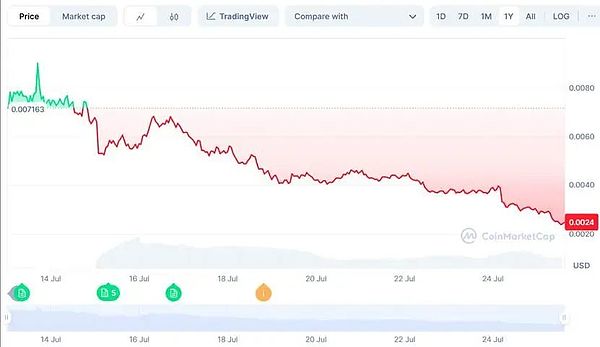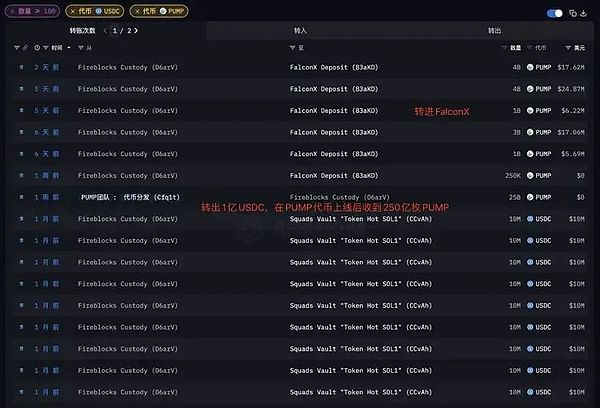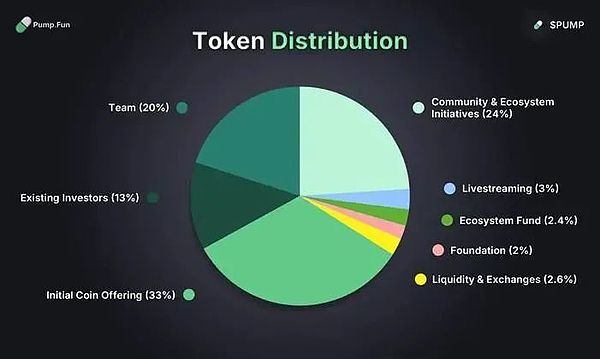Author: Zz, ChainCatcher
"The most interesting place on the internet"—Three British post-00s founders once described their work Pump.fun. Now, this sounds more like a dark humor.
In July 2025, this star platform that once disrupted the meme track with a "one-click token issuance" model is facing an unprecedented trust crisis and market challenge.
The company is not only facing commercial pressure of market share being eroded by competitors and key data plummeting, but is also deeply mired in legal troubles of securities fraud and even RICO serious crime charges. The story of Pump.fun began with enthusiasm and is now experiencing the test brought by that enthusiasm.
The Outbreak of Trust Crisis
In July 2025, a decision changed everything.
Pump.fun announced the issuance of its own token PUMP, with a fully diluted valuation as high as $4 billion. What should have been a milestone in platform development became a turning point that shook community trust.
Ironically, the platform's founders had previously won credibility with the declaration that "every pre-sale is a scam". Now, turning around to launch a massive pre-sale for PUMP, this move was seen by the community as blatant hypocrisy and betrayal.
Jocy, founder of IOSG Ventures, publicly stated on X platform that it was a high-risk "exit liquidity event", believing that raising funds at a $4 billion valuation during the downward cycle of altcoins had severely overdrafted the future. The market's concerns quickly became reality.
According to CoinMarketCap data, the token's price plummeted 75% within hours of going online. As of this article's publication, PUMP has dropped to 0.0024 USDT, falling over 30% from its public sale price of 0.004 USDT.

The underlying data is even more shocking: 340 whale wallets coordinated to sell, controlling over 60% of the pre-sale shares. According to X user EmberCN's on-chain data, just two private placement round-related wallets sold tokens worth $141 million, profiting nearly $40 million.

On social media, the atmosphere quickly shifted from celebration to despair. "We thought this was a chance to change our fate, but we ended up being fuel for their luxury yacht party." This feeling of being fooled and harvested spread rapidly, severely damaging the community foundation that Pump.fun relied on for survival.
Market Share Collapse, Business Model Facing Test
The loss of trust is directly reflected in the dismal market data.
Competitor LetsBONK.fun is eroding its market position at an astonishing speed. According to dune analytics data, in just one month, Pump.fun's market share in new token issuance plummeted from 90% to 24%, while LetsBONK.fun soared from 5% to 64%. Behind this is a contest between two completely different philosophies.
Pump.fun's model is centralized skimming, while LetsBONK.fun's success lies in using 58% of platform revenue for buyback and token destruction, building a strong value and trust flywheel through real benefit sharing.
Facing difficulties, CoinCentral reported that although the team announced using tens of millions of dollars for large-scale buybacks, they were ridiculed by the market as "using retail investors' money to buy back their own盘". Analysts pointed out that the project side sold at $0.004 and repurchased at $0.0064 using platform revenue, essentially paying a 60% premium for market value management.

While this move may boost the token price in the short term, it cannot restore the severely damaged value foundation and market confidence. Meanwhile, the global regulatory network is tightening.
In December 2024, after receiving a warning from the UK Financial Conduct Authority (FCA), Pump.fun was forced to block UK users who accounted for 9% of its traffic.
This is not an isolated incident, but an inevitable regulatory scrutiny of its "viral" growth model. Pump.fun is caught in a serious negative feedback loop: intensifying competition erodes income, declining income weakens buyback ability, token price drop damages confidence, ultimately leading to accelerated user exodus.
RICO is Hunting
More serious challenges come from the legal front. Initially, multiple class-action lawsuits accused all meme tokens on the platform of being unregistered securities. Wolf Popper LLP and other law firms proposed the "co-issuer" theory, arguing that the platform was deeply involved in token creation, trading, and liquidity process, and was not a neutral technical party.
In July 2025, the legal battle escalated dramatically. According to the amended filing in the Aguilar case, plaintiffs added charges based on the Racketeer Influenced and Corrupt Organizations Act (RICO)—a law typically used to combat organized crime.
The scope of defendants also expanded, with Solana Foundation, Solana Labs, and even its co-founders being listed as "architects, beneficiaries, and accomplices" of the fraud. This move's destructive power far exceeds the project itself, directly questioning the responsibility boundaries of the entire Solana ecosystem.
As a foundational infrastructure, does Solana have an obligation to review or supervise star projects within its ecosystem? This lawsuit has made all public chain platforms realize that their relationship with ecosystem projects might be far more dangerous than imagined. The fundamental behaviors accused by RICO include telecommunications and securities fraud, unauthorized fund transfers, and money laundering assistance.
The most explosive accusation is that the North Korean hacker group "Lazarus Group" once used Pump.fun to issue Meme coins to launder funds stolen in a Bybit hack.
Governance Flaws, Difficult to Prevent Insider Threats
However, perhaps the most shocking aspect was the internal betrayal.
On May 16, 2024, the platform was attacked, with approximately $1.9 million in funds stolen. However, the attacker was not an external hacker, but a disgruntled former employee.
The former employee named "Stacc" publicly acknowledged responsibility on social platform X, with motives directly pointing to personal revenge and contempt for "terrible bosses". Technical analysis showed that the attack originated from abuse of management privileges, not a smart contract vulnerability.
The employee used their privileged position to illegally obtain withdrawal authorization, quickly buying out token supplies through a flash loan, ultimately intercepting initial liquidity intended for DEX. While claiming to address meme coin runaway risks, an internal "backdoor" was already wide open for disgruntled employees.
This incident is like a mirror, revealing Pump.fun's stunning neglect of internal security and corporate governance during rapid development.
From Solving Runaway to "Running Away" Themselves
The story's roots began with the global "Solana Meme coin frenzy" in early 2024. Countless developers and speculators rushed into the Solana ecosystem, eager to create or capture the next 100x coin. However, creating tokens and providing initial liquidity pools (LP) was expensive and complex, often requiring thousands of dollars and specialized knowledge, a threshold that blocked numerous creative and "grassroots" players.
The protagonists were three British founders born after 2000: CEO Noah Tweedale (21 years old), CTO Dylan Kerler (21 years old), and Alon Cohen (23 years old), using the alias COO. They keenly captured this core pain point, claiming to solve meme coin runaway risks, with a vision to create the most interesting place on the internet.
Pump.fun emerged in January 2024, with its core innovation: "one-click token issuance", simplifying the complex process to just a few clicks and a few dollars. This disruptive innovation brought explosive growth.
But this talent quickly became a speculative tool. The entire business model amplified speculative sentiment. The PUMP token's pre-sale with a $40 billion valuation pushed speculation to its peak.
Disregard for business rules was consistent throughout. They won trust with an anti-pre-sale stance, then immediately launched a large-scale pre-sale. When facing FCA regulation, they chose to cut ties with their UK operating entity. The CEO denied Pump.fun was a UK company, while the COO argued that employment relationships don't imply ownership. To the public, these seemed carefully calculated rather than naive.
A complex portrait of technical geniuses, speculators, and rule disregarders presented the complete trajectory of Pump.fun's rocket-like rise and rapid fall. The young founders never anticipated that this project meant to bring fun would push them into complex legal and business whirlpools.
Standing at a Crossroads
Pump.fun stands at a crossroads. Pending litigation, declining market share, and damaged user trust have put it in a difficult position.
This seems to be another cruel demonstration of "DeFi Darwinism": a species rapidly flourishing due to unique adaptability (low threshold, high spread), ultimately facing challenges due to inability to evolve mechanisms addressing complex environments (regulation, trust, security).
For the entire crypto industry, Pump.fun's predicament raises a serious question: to what extent should platforms be responsible for behaviors within their ecosystems when innovation skirts legal boundaries?
As regulatory focus shifts from centralized exchanges to more complex DeFi applications, the next Pump.fun may already be brewing.
For every surfer, the ability to distinguish between fun and traps has never been as important as today. This story of rising from grassroots to peak, then falling from that peak, may be laying the groundwork for the crypto world's next chapter.






